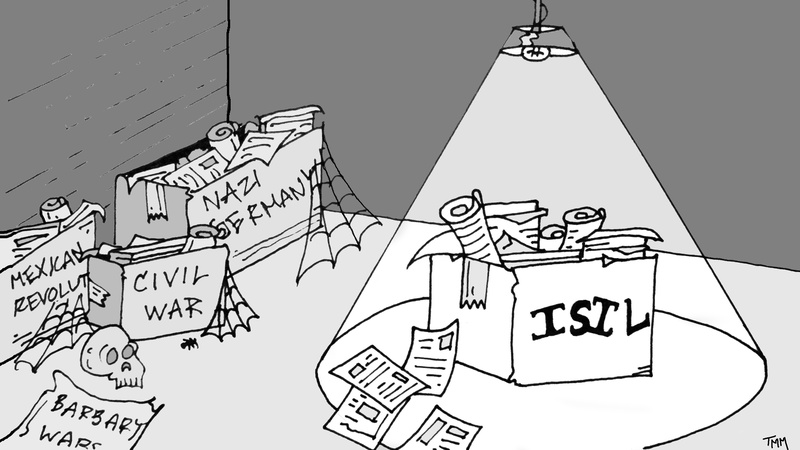The murders of American journalists, British aid workers, and countless others at the hands of the Islamic State of Iraq and the Levant (ISIL) have prompted much discussion about what makes this group tick. Some have reached thoughtful conclusions about ISIL’s conscious desire to unsettle our core sensibilities; David Brooks was cogent on this point. But other reflections have indulged in caricatures, and have perpetuated misunderstandings of how the group should be understood.
Andrea Tantaros of Fox News, for example, mused: “And they’ve been doing this for hundreds and hundreds of years. If you study the history of Islam. Our ship captains were getting murdered. The French had to tip us off. I mean these were the days of Thomas Jefferson.”
This comment gets a lot wrong, but most striking is its ignorance of what was happening in Europe at the time of the Barbary Wars, the late 18th and early 19th century conflicts to which Tantaros was referring. In the year that Congress commissioned the first ships of the United States Navy to deal with North African piracy, France was experiencing the Reign of Terror, making it the period’s world capital of beheadings. Incidentally, that episode of social turmoil gave us the word “terrorist.”
Tantaros’ comment is low-hanging fruit in the historical ignorance department. But the idea that ISIL is a purely Islamic phenomenon, reflecting a kind of brutality unknown to other cultures, deserves debunking. Far from being uniquely Islamic, ISIL represents the ugly face that societies tend to manifest when their modes of social, political, and religious organization become unsustainable.
Take, for instance, the destruction wrought by the power politics and religious fundamentalism of the Thirty Years War. According to one count, “perhaps 20 percent of Germany’s total population perished during the war.” And Europe’s internal violence did not end there: something on the order of 3 million people died in the French Revolutionary and Napoleonic Wars, followed by the tens of millions in the two World Wars. To round out the eerie parallels between all forms of radicalism, Hitler’s henchmen brought the guillotine out of retirement.
During the early modern period, the non-European world was hardly calm. Tens of millions died in numerous upheavals in China; the Mexican Revolution claimed probably one million lives. From 1861 to 1865, the United States chose to settle its central ideological dispute by wiping out about two percent of its population.
Of course, saying that death tolls from ISIL and in Syria more broadly – about 10,000 and 200,000, respectively – are not on par with history’s worst conflicts is not an argument that ISIL should be ignored or treated as anything less than evil. But looking at it in the context of major social dislocations, it appears not as an aberration, but as the kind of murderous tendency that often overtakes cultures in the midst of profound internal conflict.
Here, the Thirty Years War analogy may be particularly useful. As religious scholar Reza Aslan has noted, what is happening in present-day Islam resembles the 16th century Christian Reformation, with “a mess of different interpretations and ideas in conflict with each other.” The analogy is far from perfect, but the image of Abu Bakr el-Baghdadi, ISIL’s leader, giving a sermon in occupied Mosul is not dissimilar to, say, an Anabaptist leader in 1635 Munster attempting to forge his own polity.
The admittedly crude parallels between 21st century Iraq and Syria and 17th century Germany suggest that a very long process is playing out in the Middle East. Between the Peace of Westphalia in 1648 and the end of World War II in 1945, Europe managed to self-immolate at least three more times. China had a similar experience between the fall of the Ming in 1644 and the relaxation of Communist dogma after the 1960s.
The current unrest in the Near East needn’t be as violent as the Eurasian experience; outside influence has a role in making sure the tensions in the Arab and wider Islamic worlds resolve themselves as peacefully as possible. But the reordering of Middle Eastern states and societies is ultimately the task of Middle Eastern people; and if history is any guide, ISIL will not be the last savage faction to arise from that process.
Nelson L. Barrette, a Crimson editorial writer, lives in Winthrop House. His column appears on alternate Mondays.
Read more in Opinion
Harvard Aesthetics













